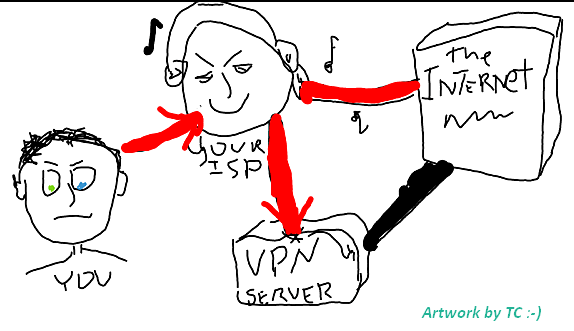What Is a VPN?
VPN is short for Vampires Prowl Nightly. So if you plan to go out when it’s dark we suggest carry a large cross, a mallet and a big wooden stake. Your best bet is to stay indoors when it’s dark, keep a lot of lights on, and lock your doors. If you need to get beer or something, wait until the sun comes up; vampires do not prowl in daylight; they sleep.
Nah. We’re just kidding you. VPN stands for Virtual Private Networks. Most of you are, right now, connected to the Internet directly. Everything you do online is being logged by your ISP… that means all your searches, all your chats, all your downloads, all your uploads, all your Facebook posts, everything, goes through your ISP. And if they wanted to they could snoop on you, record your activities, sell your search habits and buying preferences, in short they have the capacity to know where you go and what you do on the Internet.
But if you’re using a VPN, the only thing your ISP sees is that you’re connected to a server somewhere, what happens on the other server, stays on the other server. So think of it as kind of like Las Vegas. Assuming that the VPN server you’re connected to encrypts your data and does not keep logs — no one can track your activities, log your search and buying happens, or snoop on your chats and downloads. That’s in theory at least – the NSA probably sees all anyway…but your ISP is not the NSA.
Think of a VPN as a tunnel. Let’s say you’re in Richmond, Va., USA and you’re using a VPN client like Open VPN. You choose a VPN server in Brussels, Belgium. The VPN client creates a tunnel from your computer to the VPN server in Belgium, and that becomes your Internet connection – your point of entry to the World Wide Web. Sites you visit will see your IP address (which has been changed from your real IP address) and think that you’re accessing the Internet from Brussels, Belgium. You may see that the search engine is in French or whatever it is they speak over there in Brussels (German? French? Belgiumese? ) And your poor, innocent ISP? All they know is that you are connected to a server in Belgium. All your data is encrypted, leaving your ISP sobbing and whining – and they will move on to someone easier to spy on — someone more fun than you.

VPNs secure your internet activities and allow you to transfer files, written communications, chats, download files, make online purchases, search and browse the Web more safely and more securely. The only way more secure is to put your files on a flash drive and send it to the other person via FedEx – make sure you mark the package “poisonous snakes”. KIDDING! Or your could put the flash drive in your pocket, get in your car and deliver it yourself – don’t get stopped for speeding though!
Yes, we are exaggerating to make a point. We’re pretty sure that ISPs don’t have the manpower to snoop on their customers. But here’s a tip – if you have a boyfriend, girlfriend, husband or wife who works for the same ISP as you use to connect to the Internet, and things are not going so well in your relationship, best switch ISPs or use your cellphone’s 3G or 4G. Just a bit of advice from the old relationship counselors, EB and TC.


TC – is your art work correct. Not neet – correct???
Don, I think you meant to write NEAT.
Just how does a person get a VPN????
Pete: Have you heard of Google, or any other search engine ?
http://openvpn.net/
Do a Google search for VPN for more info.
ActiVPN ( https://activpN.com/en/ ) is my favorite one, fast and afordable.